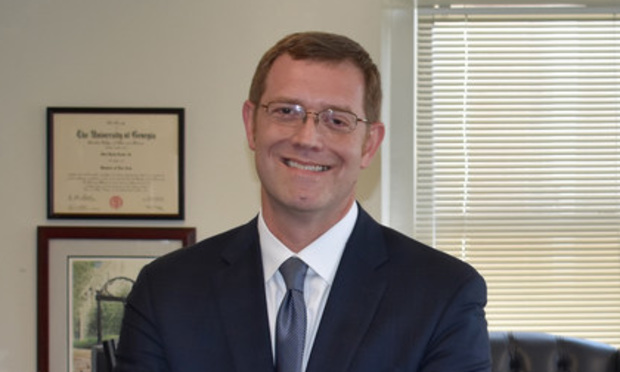DA Disagreement Over Georgia's Abortion Law Plays Out on NPR
“All Things Considered” co-host Ari Shapiro questioned Macon Judicial Circuit District Attorney David Cooke about why Cooke says he will not prosecute women or doctors under Georgia's controversial new abortion law—set to take effect Jan. 1.
June 04, 2019 at 12:02 PM
5 minute read
 David Cooke, Macon Judicial Circuit district attorney, Macon, Georgia (Courtesy photo)
David Cooke, Macon Judicial Circuit district attorney, Macon, Georgia (Courtesy photo)
Macon Judicial Circuit District Attorney David Cooke spoke out again Monday evening against Georgia's controversial new abortion law, this time on National Public Radio.
“All Things Considered” co-host Ari Shapiro focused on a public statement Cooke made May 21: “As district attorney, I swore an oath to uphold the Constitution, and I intend to honor my oath,” Cooke said then. “My office will continue its long-standing practice of supporting and protecting women who are in crisis, rather than prosecuting them. I will exercise my discretion not to prosecute women and doctors for exercising their constitutional rights. It's unfortunate that this law may turn a miscarriage into a crime scene, and I will not allow that to happen on my watch.”
On Monday, Shapiro asked Cooke if he would change his position if the U.S. Supreme Court strikes down Roe v. Wade, the landmark case establishing a woman's right to choose an abortion until a fetus can live on its own with medical help—referred to in the opinion as viability.
“If Roe v. Wade is struck down, we'll have bigger consequences than abortion,” Cooke said. Shapiro also asked Cooke if his view is influenced by his experience prosecuting crimes of rape and incest.
“I've spent my career protecting women and children. I'm not going to stop now,” Cooke said. Then the DA took note of the Georgia abortion ban's exception for victims of rape and incest—which requires a police report first.
“We know that's not how that works,” Cooke said. “Most victims never report their crimes. And if they do report them, most do that years later.”
Shapiro asked Cooke to respond to criticism from other prosecutors who say that refusing to enforce a law is an inappropriate call for a prosecutor to make.
“When you're the district attorney, the buck stops with you,” Cooke said. “I prefer to use those resources to go after the people who threaten our families the most—rapists and murderers.”
Prosecutors and legislators disagree on whether the new law could be used to prosecute women, although they do not debate that it implicates medical professionals.
Cobb County Acting District Attorney John Melvin has said that women cannot be prosecuted under the new law, but doctors can. Melvin said Democratic prosecutors who say they are not going to enforce the law are like the Nazis and Bull Connor. The comparison of his Democratic colleagues to the Jim Crow South and Hitler's Germany comes from Melvin's view that all have denied someone's personhood. Prosecutors who have said publicly that they will not make criminal cases under the new abortion law are denying the personhood of embryos and fetuses bestowed by House Bill 481, Melvin said. Melvin advanced those ideas in an article published on the MerionWest.com website, and told the Daily Report, “I'm very pro life” but supports the new law because it is a DA's job is to enforce all laws, regardless of personal convictions.
The General Assembly passed the bill this year, and Gov. Brian Kemp signed it into law in May. It bans abortion in Georgia as soon as an embryonic pulse can be heard with an ultrasound. That point comes at about six weeks of pregnancy, or two weeks after conception, when the embryo is the size of a pea. Supporters call the sound a heartbeat. Opponents say the sound is not really a heartbeat because the heart hasn't formed.
The law's effect on women has been a source of debate and uncertainty, with sponsors of the bill saying women wouldn't be prosecuted. But they also added an “affirmative defense” to allow women to argue in court that they had the abortion to save themselves—similar to a self-defense argument in a murder case.
The law clearly makes doctors and medical professionals and other clinic staff subject to criminal prosecution for performing or assisting in abortion services. The law also allows for investigations of women who lose a pregnancy to miscarriage—as 1 in 3 do.
The Medical Association of Georgia lobbied against House Bill 481 because of its reach into medicine. In a letter to the state Senate sponsor of the bill, Sen. Renee Unterman, MAG President Dr. Rutledge Forney said the group “opposes the bill because it would criminalize physicians practicing within their standard of care, creates a new civil cause of action against physicians, could undermine efforts to recruit and retain OB-GYN in Georgia, and could further restrict access to health care in rural Georgia.”
Georgia was the seventh state to pass a near-total abortion ban. Three more have followed since. Others are being considered.
The so-called heartbeat bill was created by Janet Porter, an Ohio activist and former pro-life lobbyist who started a network of organizations to promote bans, Faith2Action. The group's website includes a model heartbeat bill and resource groups that offer legal assistance for opposing abortion, and other issues. Porter said the bill was “carefully crafted to be the arrow in the heart of Roe v. Wade—a bill born to go to court.”
This content has been archived. It is available through our partners, LexisNexis® and Bloomberg Law.
To view this content, please continue to their sites.
Not a Lexis Subscriber?
Subscribe Now
Not a Bloomberg Law Subscriber?
Subscribe Now
NOT FOR REPRINT
© 2025 ALM Global, LLC, All Rights Reserved. Request academic re-use from www.copyright.com. All other uses, submit a request to [email protected]. For more information visit Asset & Logo Licensing.
You Might Like
View All
40% Contingency: A New Ruling Just Cost This Plaintiff Team $827K in Legal Fees
6 minute read
'David and Goliath' Dispute Between Software Developers Ends in $24M Settlement

Trending Stories
- 1Stevens & Lee Names New Delaware Shareholder
- 2U.S. Supreme Court Denies Trump Effort to Halt Sentencing
- 3From CLO to President: Kevin Boon Takes the Helm at Mysten Labs
- 4How Law Schools Fared on California's July 2024 Bar Exam
- 5'Discordant Dots': Why Phila. Zantac Judge Rejected Bid for His Recusal
Who Got The Work
Michael G. Bongiorno, Andrew Scott Dulberg and Elizabeth E. Driscoll from Wilmer Cutler Pickering Hale and Dorr have stepped in to represent Symbotic Inc., an A.I.-enabled technology platform that focuses on increasing supply chain efficiency, and other defendants in a pending shareholder derivative lawsuit. The case, filed Oct. 2 in Massachusetts District Court by the Brown Law Firm on behalf of Stephen Austen, accuses certain officers and directors of misleading investors in regard to Symbotic's potential for margin growth by failing to disclose that the company was not equipped to timely deploy its systems or manage expenses through project delays. The case, assigned to U.S. District Judge Nathaniel M. Gorton, is 1:24-cv-12522, Austen v. Cohen et al.
Who Got The Work
Edmund Polubinski and Marie Killmond of Davis Polk & Wardwell have entered appearances for data platform software development company MongoDB and other defendants in a pending shareholder derivative lawsuit. The action, filed Oct. 7 in New York Southern District Court by the Brown Law Firm, accuses the company's directors and/or officers of falsely expressing confidence in the company’s restructuring of its sales incentive plan and downplaying the severity of decreases in its upfront commitments. The case is 1:24-cv-07594, Roy v. Ittycheria et al.
Who Got The Work
Amy O. Bruchs and Kurt F. Ellison of Michael Best & Friedrich have entered appearances for Epic Systems Corp. in a pending employment discrimination lawsuit. The suit was filed Sept. 7 in Wisconsin Western District Court by Levine Eisberner LLC and Siri & Glimstad on behalf of a project manager who claims that he was wrongfully terminated after applying for a religious exemption to the defendant's COVID-19 vaccine mandate. The case, assigned to U.S. Magistrate Judge Anita Marie Boor, is 3:24-cv-00630, Secker, Nathan v. Epic Systems Corporation.
Who Got The Work
David X. Sullivan, Thomas J. Finn and Gregory A. Hall from McCarter & English have entered appearances for Sunrun Installation Services in a pending civil rights lawsuit. The complaint was filed Sept. 4 in Connecticut District Court by attorney Robert M. Berke on behalf of former employee George Edward Steins, who was arrested and charged with employing an unregistered home improvement salesperson. The complaint alleges that had Sunrun informed the Connecticut Department of Consumer Protection that the plaintiff's employment had ended in 2017 and that he no longer held Sunrun's home improvement contractor license, he would not have been hit with charges, which were dismissed in May 2024. The case, assigned to U.S. District Judge Jeffrey A. Meyer, is 3:24-cv-01423, Steins v. Sunrun, Inc. et al.
Who Got The Work
Greenberg Traurig shareholder Joshua L. Raskin has entered an appearance for boohoo.com UK Ltd. in a pending patent infringement lawsuit. The suit, filed Sept. 3 in Texas Eastern District Court by Rozier Hardt McDonough on behalf of Alto Dynamics, asserts five patents related to an online shopping platform. The case, assigned to U.S. District Judge Rodney Gilstrap, is 2:24-cv-00719, Alto Dynamics, LLC v. boohoo.com UK Limited.
Featured Firms
Law Offices of Gary Martin Hays & Associates, P.C.
(470) 294-1674
Law Offices of Mark E. Salomone
(857) 444-6468
Smith & Hassler
(713) 739-1250







